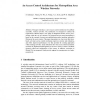Free Online Productivity Tools
i2Speak
i2Symbol
i2OCR
iTex2Img
iWeb2Print
iWeb2Shot
i2Type
iPdf2Split
iPdf2Merge
i2Bopomofo
i2Arabic
i2Style
i2Image
i2PDF
iLatex2Rtf
Sci2ools
145
click to vote
IDMS
2001
Springer
2001
Springer
An Access Control Architecture for Metropolitan Area Wireless Networks
This paper introduces a novel access control architecture for publicly accessible, wireless networks. The architecture was designed to address the requirements obtained from a case study of ubiquitous Internet service provisioning within the city of Lancaster. The proposed access control mechanism is based on the concepts of secure user authentication, packet marking, and packet filtering at the access routers. The paper demonstrates to what extent this tokenbased, soft-state access control mechanism improves security and robustness, and offers improved performance over that provided by existing approaches within roaming networks. Early indications show the access control mechanism can better be implemented through the use of active routers, in order to facilitate dynamic rollout and configuration of the system. In addition, extensions to Mobile IPv6 are proposed, which provide support for roaming users at a fundamental level.
Access Control Architecture | Access Control Mechanism | IDMS 2001 | Multimedia | Proposed Access Control |
Related Content
| Added | 30 Jul 2010 |
| Updated | 30 Jul 2010 |
| Type | Conference |
| Year | 2001 |
| Where | IDMS |
| Authors | Stefan Schmid, Joe Finney, Maomao Wu, Adrian Friday, Andrew Scott, Doug Shepherd |
Comments (0)

